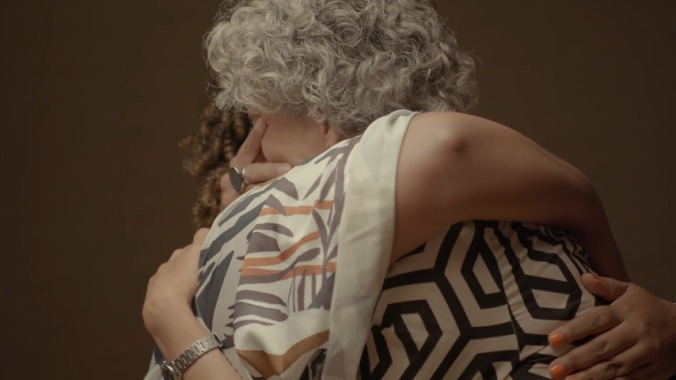Psychics Soothe NYC’s Wounds in Eccentric, Frustrating Doc Look into My Eyes

During the season one finale of Sex and the City, “Oh Come All Ye Faithful,” Charlotte York makes an appointment with Noanie, a psychic, to discover more about when she will get married, and to whom. The psychic tells Charlotte point blank that she does not see marriage in her future, which does not align with Charlotte’s narrative she’s written for herself in her head. “How can you say that like that? What about my feelings?” Charlotte asks. “Honey, I’m a psychic,” Noanie deadpans. “I’m not a shrink.”
To use Lana Wilson’s documentary Look into My Eyes to measure the cultural temperature around psychics, things have certainly changed since Charlotte sat in Noanie’s chair in 1998; many are moving away from psychiatry and toward psychics to answer life’s questions. Wilson could have alternatively titled this film What about My Feelings? Frankly, a lot of people in this film mistake their psychic for a licensed mental health professional, and many of the psychics erroneously see themselves that way, too. Look into My Eyes opens and closes with an ER doctor visiting a psychic for answers surrounding the violent, wrongful death of a child patient she saw decades prior. This set alarm bells off in my head: If anyone should be seeing a therapist and not a psychic, it’s this woman.
“Earth is hard,” is a refrain we hear more than once in Look into My Eyes, an intimate illustration of seven New York City psychics and the people who pay them money to get in touch with their dead loved ones (yes, including pets). “Earth is hard,” is both true and an overly simplistic way to explain away problems that feel too big to tackle. If a therapist said this to me, I would probably get a new therapist. Living on Earth these days is certainly not easy, as outlined by the anxieties of both the “healers” and their “patients.” Whether they are burdened by climate change worries, intergenerational trauma, career troubles or heartbreak, it seems like everyone could use a break. One way to soothe achy nerves is to self-narrativize, but that only addresses the symptoms, not the cause, of our problems. A therapist would challenge our self-narratives as a way to heal, not tell us what we want to hear, which is all that these psychics can do.
Look into My Eyes is not intended as an investigation setting out to either prove or disprove the credibility of Wilson’s subjects, but it does unintentionally reveal a lack of integrity in some of her subjects, which Wilson (off-puttingly) does not address. Many of the psychics barely buy into their own act. During one session, a young Black man struggles with visions of an enslaved ancestor, and looks to psychic Ilka Pinheiro for clarity on what these visions could mean. Pinheiro, in a moment that could be described only as improv, explains that his ancestor doesn’t want the young man to be chained down by grief, as he himself was chained. It’s an awkward moment, one hard to fully buy.
-

-

-

-

-

-

-

-

-

-

-

-

-

-

-

-

-

-

-

-

-

-

-

-

-

-

-

-

-

-

-

-

-

-

-

-

-

-

-

-








































